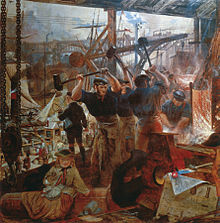Industrial Age
[1][2] While it is commonly believed that the Industrial Age was supplanted by the Information Age in the late 20th century,[3] a view that has become common since the Revolutions of 1989, much of the Third World economy is still based on manufacturing, although mobile phones are now commonplace even in the poorest of countries,[4] enabling access to global information networks.The Industrial Age began in Great Britain in the mid-18th century and was fueled by coal mining from places such as Wales and County Durham.The Industrial Revolution began in Great Britain because it had the factors of production, land (all natural resources), capital, and labour.The domestic system sprouted as a result of when businesses began importing raw cotton, employing spinners and weavers to make it into cloth from their home.The Industrial Age is defined by mass production, broadcasting, the rise of the nation state, power, modern medicine and running water.
Industrial RevolutionWilliam Bell Scottperiod of historyGreat Britainmachinespower loomsteam engineindustryInformation AgeRevolutions of 1989Third Worldmanufacturingdeveloping countriescoal miningCounty Durhamspheres of influencemerchant marineContinental EuropeNorth Americamechanizationdomestic systemJames Hargreavesspinning jennyRichard Arkwrightfactory systemEdmund CartwrightThomas NewcomenJames Wattmass productionbroadcastingnation statemodern medicinerunning waterImagination AgeThe EconomistPre-industrialHunter-gathererMontaneCircumpolarSubarcticNomadicPastoralHorticulturalAgricultural/AgrarianFeudalComplexProto-IndustrialPost-industrial